An Analysis of Music's Influence on Human Psychology and Emotion
VerifiedAdded on 2023/01/13
|11
|3099
|1
Essay
AI Summary
This essay delves into the intricate relationship between music and human psychology, exploring how music has been an integral part of human culture and communication since ancient times. It reviews Barry Goldstein's article, "The Fascinating Ways That Music Affects Your Mood and Mind," and supports or contradicts the author's points with other literature. The essay discusses how music affects the brain, influencing memory, emotion, learning, attention, and neuroplasticity. It highlights the use of music therapy, the connection between music and memory (especially in Alzheimer's patients), and the impact of music on learning and neuroplasticity. Furthermore, the essay explores how music can improve attention and discusses the role of different music genres in eliciting emotions. The essay also addresses both the positive and negative effects of music on human mood and outlines practical methods for applying the theory, such as musical improvisation, singing, and chanting, to enhance mood and cognitive abilities.
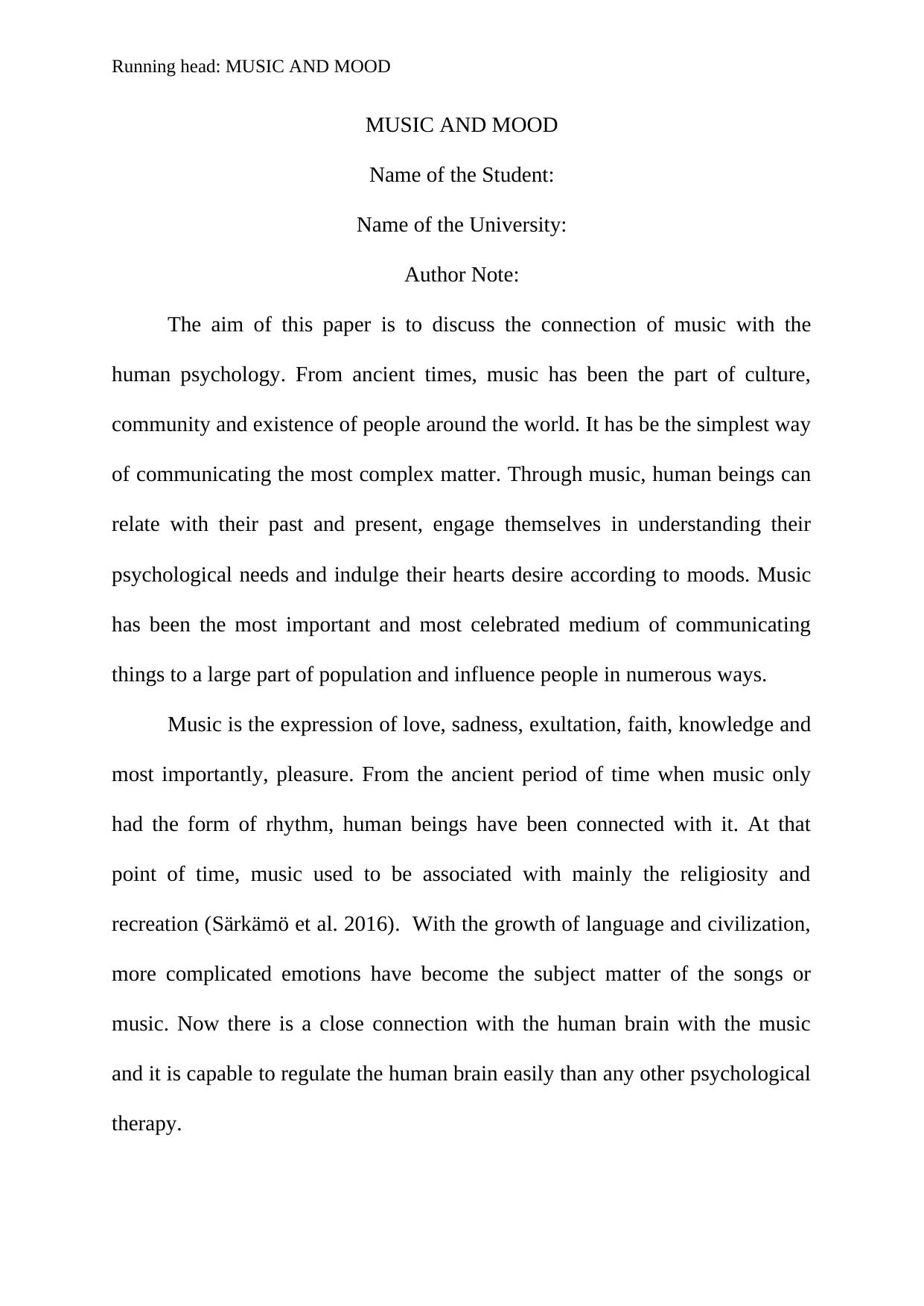
Running head: MUSIC AND MOOD
MUSIC AND MOOD
Name of the Student:
Name of the University:
Author Note:
The aim of this paper is to discuss the connection of music with the
human psychology. From ancient times, music has been the part of culture,
community and existence of people around the world. It has be the simplest way
of communicating the most complex matter. Through music, human beings can
relate with their past and present, engage themselves in understanding their
psychological needs and indulge their hearts desire according to moods. Music
has been the most important and most celebrated medium of communicating
things to a large part of population and influence people in numerous ways.
Music is the expression of love, sadness, exultation, faith, knowledge and
most importantly, pleasure. From the ancient period of time when music only
had the form of rhythm, human beings have been connected with it. At that
point of time, music used to be associated with mainly the religiosity and
recreation (Särkämö et al. 2016). With the growth of language and civilization,
more complicated emotions have become the subject matter of the songs or
music. Now there is a close connection with the human brain with the music
and it is capable to regulate the human brain easily than any other psychological
therapy.
MUSIC AND MOOD
Name of the Student:
Name of the University:
Author Note:
The aim of this paper is to discuss the connection of music with the
human psychology. From ancient times, music has been the part of culture,
community and existence of people around the world. It has be the simplest way
of communicating the most complex matter. Through music, human beings can
relate with their past and present, engage themselves in understanding their
psychological needs and indulge their hearts desire according to moods. Music
has been the most important and most celebrated medium of communicating
things to a large part of population and influence people in numerous ways.
Music is the expression of love, sadness, exultation, faith, knowledge and
most importantly, pleasure. From the ancient period of time when music only
had the form of rhythm, human beings have been connected with it. At that
point of time, music used to be associated with mainly the religiosity and
recreation (Särkämö et al. 2016). With the growth of language and civilization,
more complicated emotions have become the subject matter of the songs or
music. Now there is a close connection with the human brain with the music
and it is capable to regulate the human brain easily than any other psychological
therapy.
Paraphrase This Document
Need a fresh take? Get an instant paraphrase of this document with our AI Paraphraser
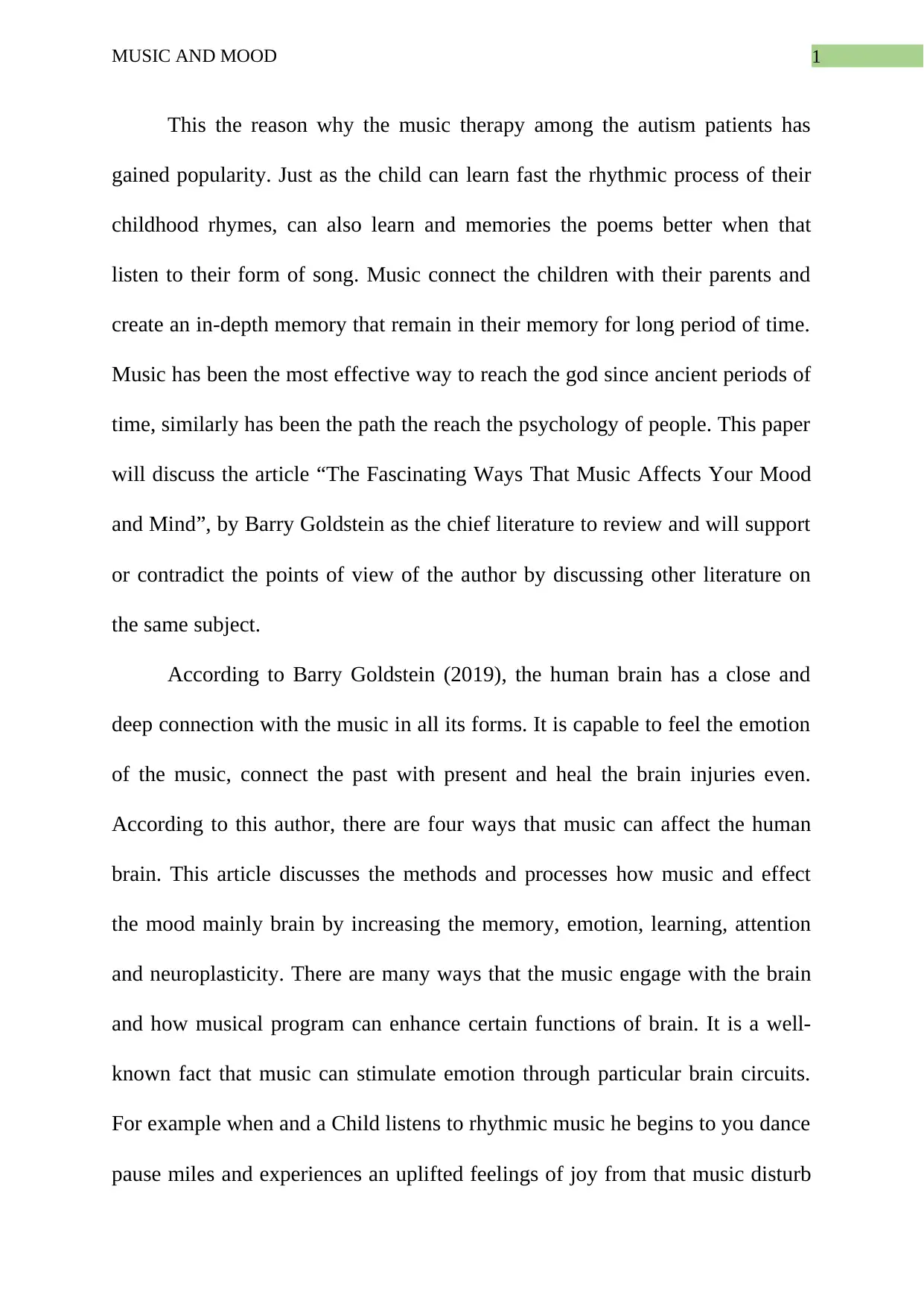
1MUSIC AND MOOD
This the reason why the music therapy among the autism patients has
gained popularity. Just as the child can learn fast the rhythmic process of their
childhood rhymes, can also learn and memories the poems better when that
listen to their form of song. Music connect the children with their parents and
create an in-depth memory that remain in their memory for long period of time.
Music has been the most effective way to reach the god since ancient periods of
time, similarly has been the path the reach the psychology of people. This paper
will discuss the article “The Fascinating Ways That Music Affects Your Mood
and Mind”, by Barry Goldstein as the chief literature to review and will support
or contradict the points of view of the author by discussing other literature on
the same subject.
According to Barry Goldstein (2019), the human brain has a close and
deep connection with the music in all its forms. It is capable to feel the emotion
of the music, connect the past with present and heal the brain injuries even.
According to this author, there are four ways that music can affect the human
brain. This article discusses the methods and processes how music and effect
the mood mainly brain by increasing the memory, emotion, learning, attention
and neuroplasticity. There are many ways that the music engage with the brain
and how musical program can enhance certain functions of brain. It is a well-
known fact that music can stimulate emotion through particular brain circuits.
For example when and a Child listens to rhythmic music he begins to you dance
pause miles and experiences an uplifted feelings of joy from that music disturb
This the reason why the music therapy among the autism patients has
gained popularity. Just as the child can learn fast the rhythmic process of their
childhood rhymes, can also learn and memories the poems better when that
listen to their form of song. Music connect the children with their parents and
create an in-depth memory that remain in their memory for long period of time.
Music has been the most effective way to reach the god since ancient periods of
time, similarly has been the path the reach the psychology of people. This paper
will discuss the article “The Fascinating Ways That Music Affects Your Mood
and Mind”, by Barry Goldstein as the chief literature to review and will support
or contradict the points of view of the author by discussing other literature on
the same subject.
According to Barry Goldstein (2019), the human brain has a close and
deep connection with the music in all its forms. It is capable to feel the emotion
of the music, connect the past with present and heal the brain injuries even.
According to this author, there are four ways that music can affect the human
brain. This article discusses the methods and processes how music and effect
the mood mainly brain by increasing the memory, emotion, learning, attention
and neuroplasticity. There are many ways that the music engage with the brain
and how musical program can enhance certain functions of brain. It is a well-
known fact that music can stimulate emotion through particular brain circuits.
For example when and a Child listens to rhythmic music he begins to you dance
pause miles and experiences an uplifted feelings of joy from that music disturb
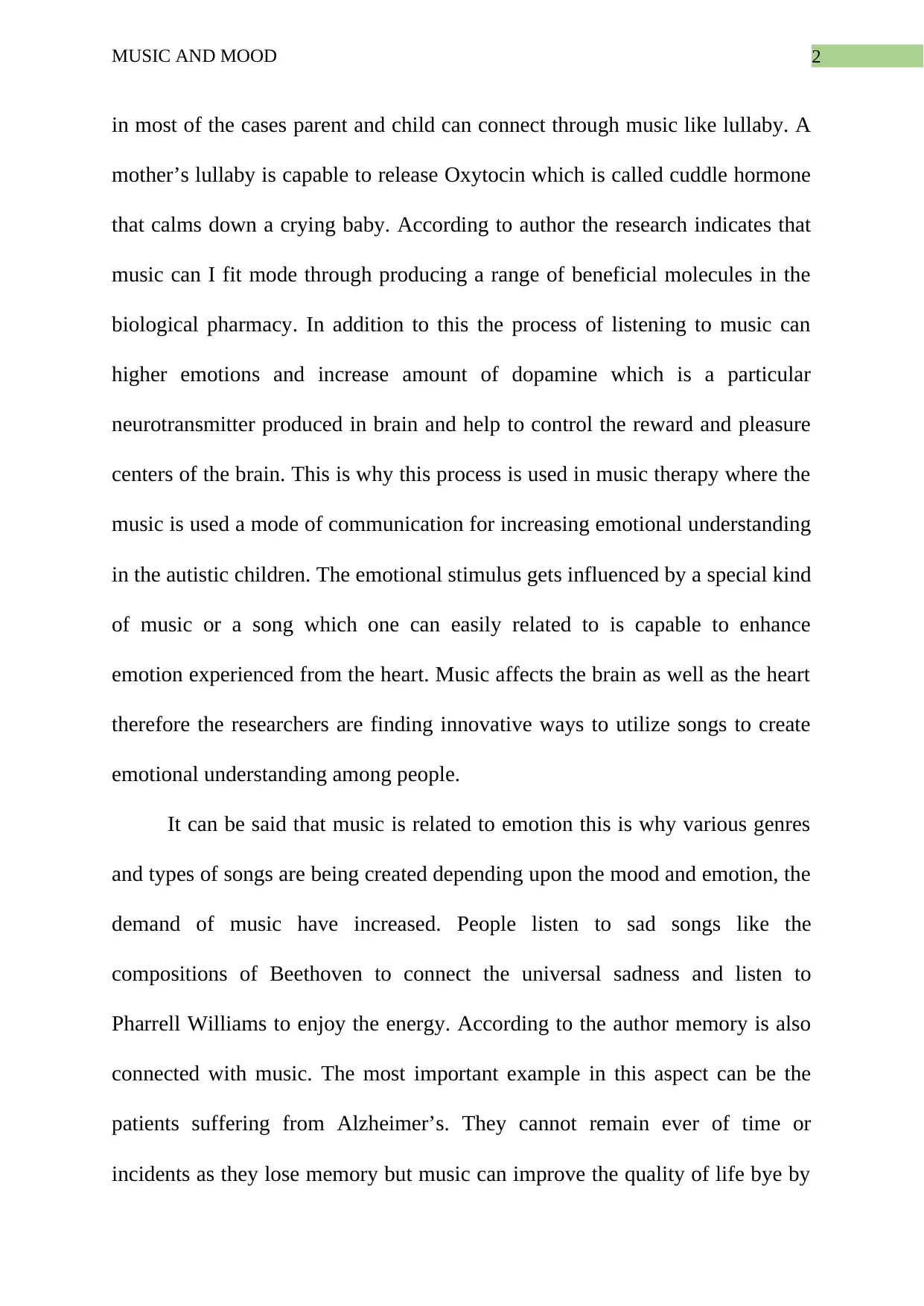
2MUSIC AND MOOD
in most of the cases parent and child can connect through music like lullaby. A
mother’s lullaby is capable to release Oxytocin which is called cuddle hormone
that calms down a crying baby. According to author the research indicates that
music can I fit mode through producing a range of beneficial molecules in the
biological pharmacy. In addition to this the process of listening to music can
higher emotions and increase amount of dopamine which is a particular
neurotransmitter produced in brain and help to control the reward and pleasure
centers of the brain. This is why this process is used in music therapy where the
music is used a mode of communication for increasing emotional understanding
in the autistic children. The emotional stimulus gets influenced by a special kind
of music or a song which one can easily related to is capable to enhance
emotion experienced from the heart. Music affects the brain as well as the heart
therefore the researchers are finding innovative ways to utilize songs to create
emotional understanding among people.
It can be said that music is related to emotion this is why various genres
and types of songs are being created depending upon the mood and emotion, the
demand of music have increased. People listen to sad songs like the
compositions of Beethoven to connect the universal sadness and listen to
Pharrell Williams to enjoy the energy. According to the author memory is also
connected with music. The most important example in this aspect can be the
patients suffering from Alzheimer’s. They cannot remain ever of time or
incidents as they lose memory but music can improve the quality of life bye by
in most of the cases parent and child can connect through music like lullaby. A
mother’s lullaby is capable to release Oxytocin which is called cuddle hormone
that calms down a crying baby. According to author the research indicates that
music can I fit mode through producing a range of beneficial molecules in the
biological pharmacy. In addition to this the process of listening to music can
higher emotions and increase amount of dopamine which is a particular
neurotransmitter produced in brain and help to control the reward and pleasure
centers of the brain. This is why this process is used in music therapy where the
music is used a mode of communication for increasing emotional understanding
in the autistic children. The emotional stimulus gets influenced by a special kind
of music or a song which one can easily related to is capable to enhance
emotion experienced from the heart. Music affects the brain as well as the heart
therefore the researchers are finding innovative ways to utilize songs to create
emotional understanding among people.
It can be said that music is related to emotion this is why various genres
and types of songs are being created depending upon the mood and emotion, the
demand of music have increased. People listen to sad songs like the
compositions of Beethoven to connect the universal sadness and listen to
Pharrell Williams to enjoy the energy. According to the author memory is also
connected with music. The most important example in this aspect can be the
patients suffering from Alzheimer’s. They cannot remain ever of time or
incidents as they lose memory but music can improve the quality of life bye by
⊘ This is a preview!⊘
Do you want full access?
Subscribe today to unlock all pages.

Trusted by 1+ million students worldwide
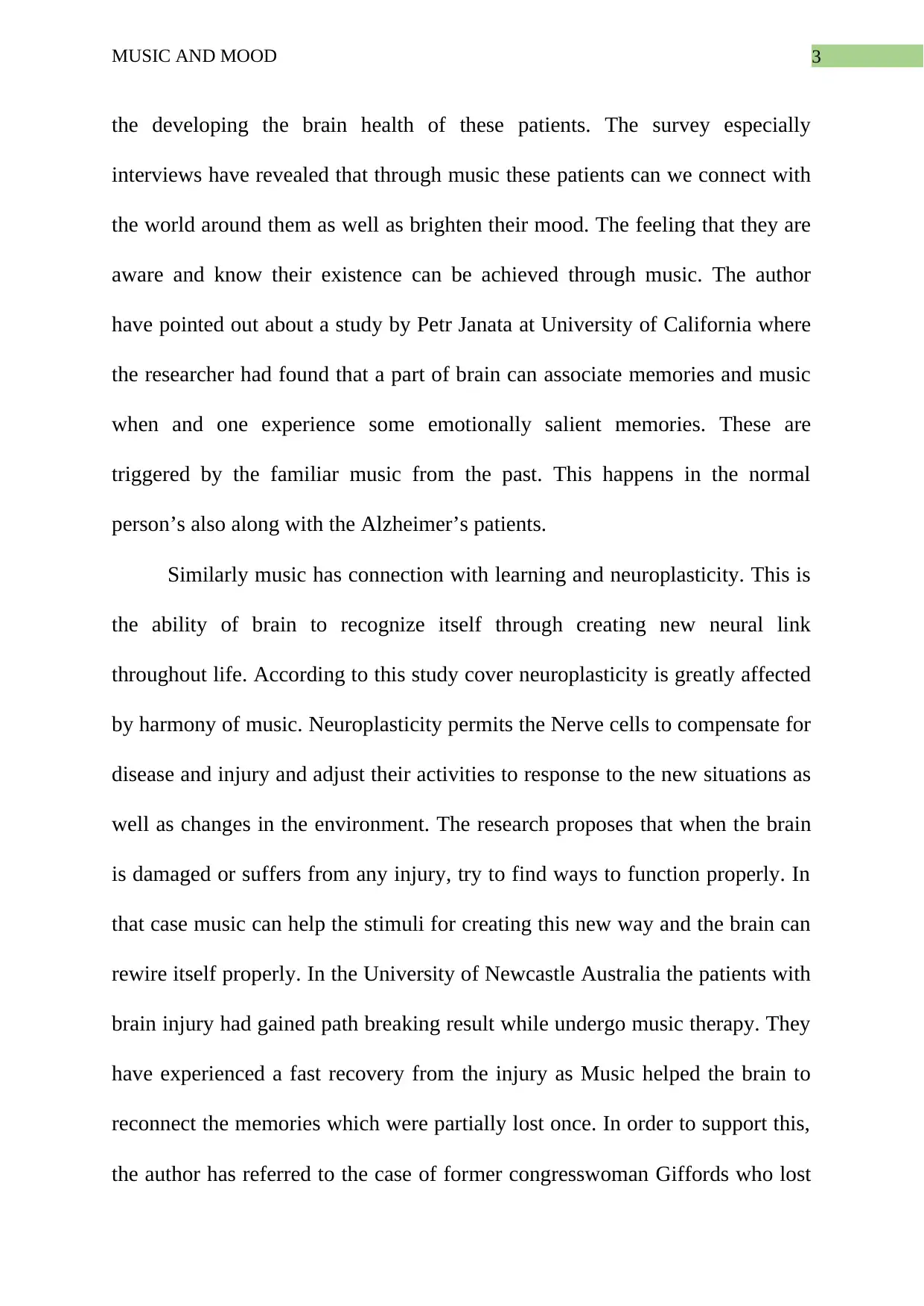
3MUSIC AND MOOD
the developing the brain health of these patients. The survey especially
interviews have revealed that through music these patients can we connect with
the world around them as well as brighten their mood. The feeling that they are
aware and know their existence can be achieved through music. The author
have pointed out about a study by Petr Janata at University of California where
the researcher had found that a part of brain can associate memories and music
when and one experience some emotionally salient memories. These are
triggered by the familiar music from the past. This happens in the normal
person’s also along with the Alzheimer’s patients.
Similarly music has connection with learning and neuroplasticity. This is
the ability of brain to recognize itself through creating new neural link
throughout life. According to this study cover neuroplasticity is greatly affected
by harmony of music. Neuroplasticity permits the Nerve cells to compensate for
disease and injury and adjust their activities to response to the new situations as
well as changes in the environment. The research proposes that when the brain
is damaged or suffers from any injury, try to find ways to function properly. In
that case music can help the stimuli for creating this new way and the brain can
rewire itself properly. In the University of Newcastle Australia the patients with
brain injury had gained path breaking result while undergo music therapy. They
have experienced a fast recovery from the injury as Music helped the brain to
reconnect the memories which were partially lost once. In order to support this,
the author has referred to the case of former congresswoman Giffords who lost
the developing the brain health of these patients. The survey especially
interviews have revealed that through music these patients can we connect with
the world around them as well as brighten their mood. The feeling that they are
aware and know their existence can be achieved through music. The author
have pointed out about a study by Petr Janata at University of California where
the researcher had found that a part of brain can associate memories and music
when and one experience some emotionally salient memories. These are
triggered by the familiar music from the past. This happens in the normal
person’s also along with the Alzheimer’s patients.
Similarly music has connection with learning and neuroplasticity. This is
the ability of brain to recognize itself through creating new neural link
throughout life. According to this study cover neuroplasticity is greatly affected
by harmony of music. Neuroplasticity permits the Nerve cells to compensate for
disease and injury and adjust their activities to response to the new situations as
well as changes in the environment. The research proposes that when the brain
is damaged or suffers from any injury, try to find ways to function properly. In
that case music can help the stimuli for creating this new way and the brain can
rewire itself properly. In the University of Newcastle Australia the patients with
brain injury had gained path breaking result while undergo music therapy. They
have experienced a fast recovery from the injury as Music helped the brain to
reconnect the memories which were partially lost once. In order to support this,
the author has referred to the case of former congresswoman Giffords who lost
Paraphrase This Document
Need a fresh take? Get an instant paraphrase of this document with our AI Paraphraser
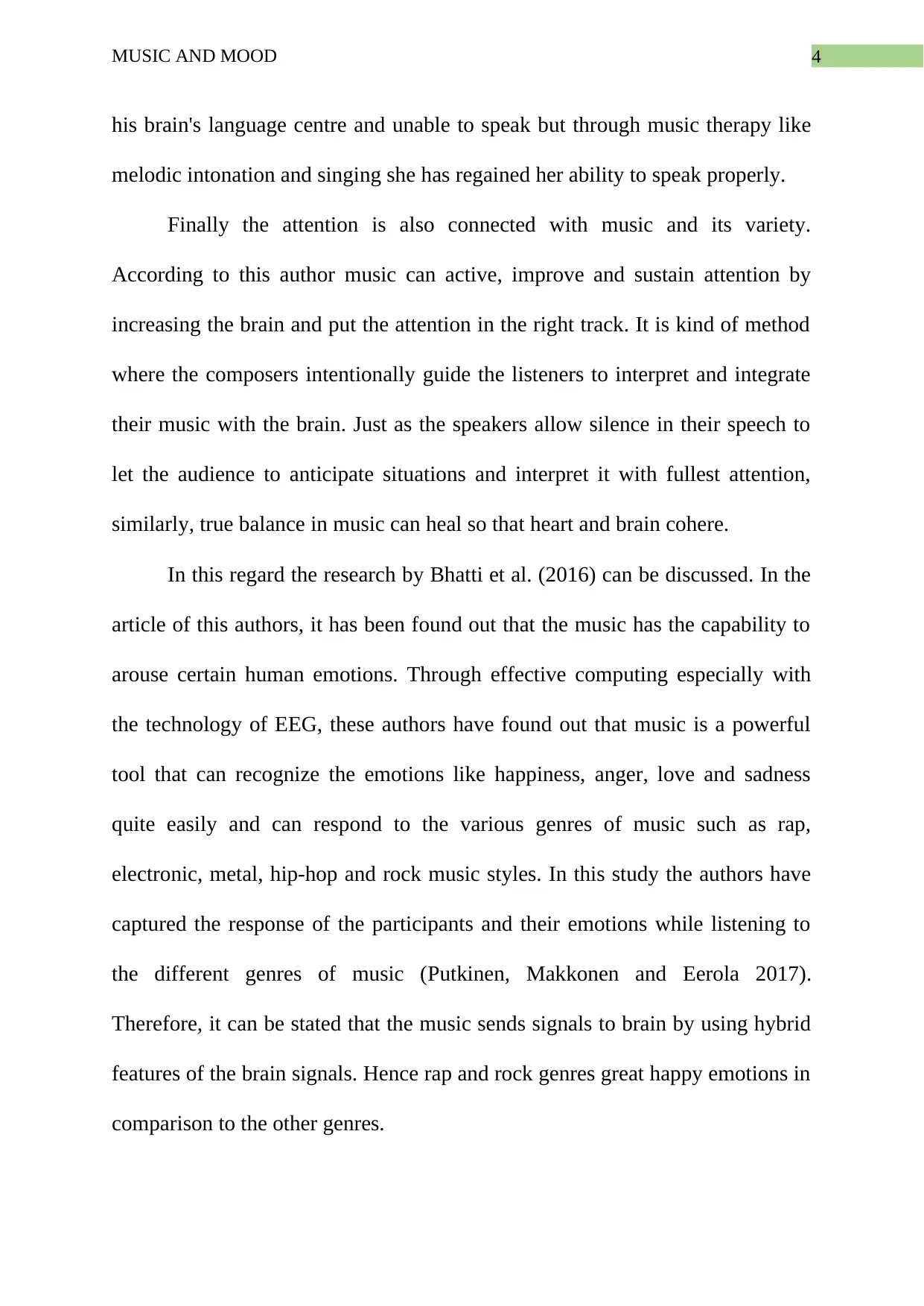
4MUSIC AND MOOD
his brain's language centre and unable to speak but through music therapy like
melodic intonation and singing she has regained her ability to speak properly.
Finally the attention is also connected with music and its variety.
According to this author music can active, improve and sustain attention by
increasing the brain and put the attention in the right track. It is kind of method
where the composers intentionally guide the listeners to interpret and integrate
their music with the brain. Just as the speakers allow silence in their speech to
let the audience to anticipate situations and interpret it with fullest attention,
similarly, true balance in music can heal so that heart and brain cohere.
In this regard the research by Bhatti et al. (2016) can be discussed. In the
article of this authors, it has been found out that the music has the capability to
arouse certain human emotions. Through effective computing especially with
the technology of EEG, these authors have found out that music is a powerful
tool that can recognize the emotions like happiness, anger, love and sadness
quite easily and can respond to the various genres of music such as rap,
electronic, metal, hip-hop and rock music styles. In this study the authors have
captured the response of the participants and their emotions while listening to
the different genres of music (Putkinen, Makkonen and Eerola 2017).
Therefore, it can be stated that the music sends signals to brain by using hybrid
features of the brain signals. Hence rap and rock genres great happy emotions in
comparison to the other genres.
his brain's language centre and unable to speak but through music therapy like
melodic intonation and singing she has regained her ability to speak properly.
Finally the attention is also connected with music and its variety.
According to this author music can active, improve and sustain attention by
increasing the brain and put the attention in the right track. It is kind of method
where the composers intentionally guide the listeners to interpret and integrate
their music with the brain. Just as the speakers allow silence in their speech to
let the audience to anticipate situations and interpret it with fullest attention,
similarly, true balance in music can heal so that heart and brain cohere.
In this regard the research by Bhatti et al. (2016) can be discussed. In the
article of this authors, it has been found out that the music has the capability to
arouse certain human emotions. Through effective computing especially with
the technology of EEG, these authors have found out that music is a powerful
tool that can recognize the emotions like happiness, anger, love and sadness
quite easily and can respond to the various genres of music such as rap,
electronic, metal, hip-hop and rock music styles. In this study the authors have
captured the response of the participants and their emotions while listening to
the different genres of music (Putkinen, Makkonen and Eerola 2017).
Therefore, it can be stated that the music sends signals to brain by using hybrid
features of the brain signals. Hence rap and rock genres great happy emotions in
comparison to the other genres.
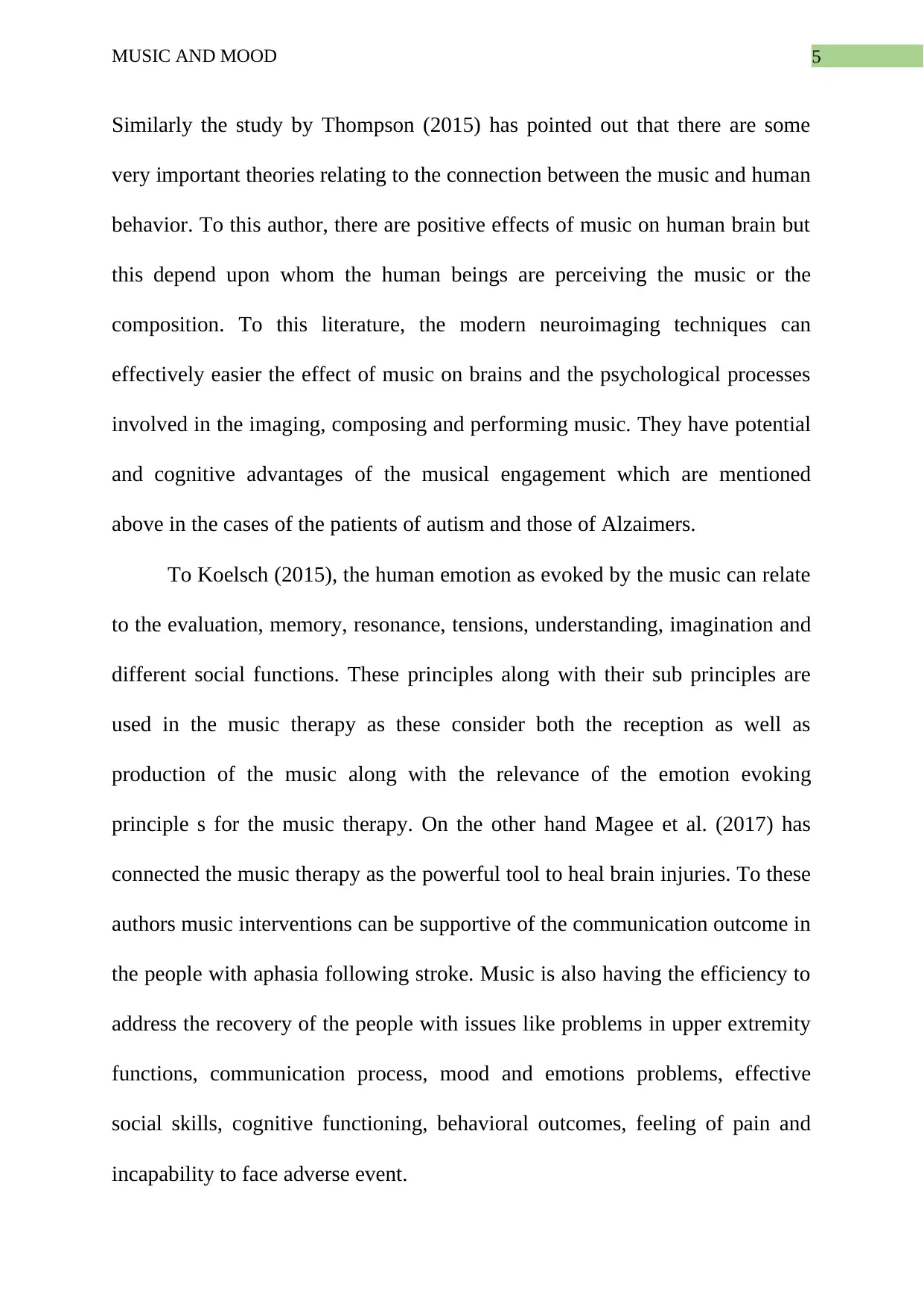
5MUSIC AND MOOD
Similarly the study by Thompson (2015) has pointed out that there are some
very important theories relating to the connection between the music and human
behavior. To this author, there are positive effects of music on human brain but
this depend upon whom the human beings are perceiving the music or the
composition. To this literature, the modern neuroimaging techniques can
effectively easier the effect of music on brains and the psychological processes
involved in the imaging, composing and performing music. They have potential
and cognitive advantages of the musical engagement which are mentioned
above in the cases of the patients of autism and those of Alzaimers.
To Koelsch (2015), the human emotion as evoked by the music can relate
to the evaluation, memory, resonance, tensions, understanding, imagination and
different social functions. These principles along with their sub principles are
used in the music therapy as these consider both the reception as well as
production of the music along with the relevance of the emotion evoking
principle s for the music therapy. On the other hand Magee et al. (2017) has
connected the music therapy as the powerful tool to heal brain injuries. To these
authors music interventions can be supportive of the communication outcome in
the people with aphasia following stroke. Music is also having the efficiency to
address the recovery of the people with issues like problems in upper extremity
functions, communication process, mood and emotions problems, effective
social skills, cognitive functioning, behavioral outcomes, feeling of pain and
incapability to face adverse event.
Similarly the study by Thompson (2015) has pointed out that there are some
very important theories relating to the connection between the music and human
behavior. To this author, there are positive effects of music on human brain but
this depend upon whom the human beings are perceiving the music or the
composition. To this literature, the modern neuroimaging techniques can
effectively easier the effect of music on brains and the psychological processes
involved in the imaging, composing and performing music. They have potential
and cognitive advantages of the musical engagement which are mentioned
above in the cases of the patients of autism and those of Alzaimers.
To Koelsch (2015), the human emotion as evoked by the music can relate
to the evaluation, memory, resonance, tensions, understanding, imagination and
different social functions. These principles along with their sub principles are
used in the music therapy as these consider both the reception as well as
production of the music along with the relevance of the emotion evoking
principle s for the music therapy. On the other hand Magee et al. (2017) has
connected the music therapy as the powerful tool to heal brain injuries. To these
authors music interventions can be supportive of the communication outcome in
the people with aphasia following stroke. Music is also having the efficiency to
address the recovery of the people with issues like problems in upper extremity
functions, communication process, mood and emotions problems, effective
social skills, cognitive functioning, behavioral outcomes, feeling of pain and
incapability to face adverse event.
⊘ This is a preview!⊘
Do you want full access?
Subscribe today to unlock all pages.

Trusted by 1+ million students worldwide
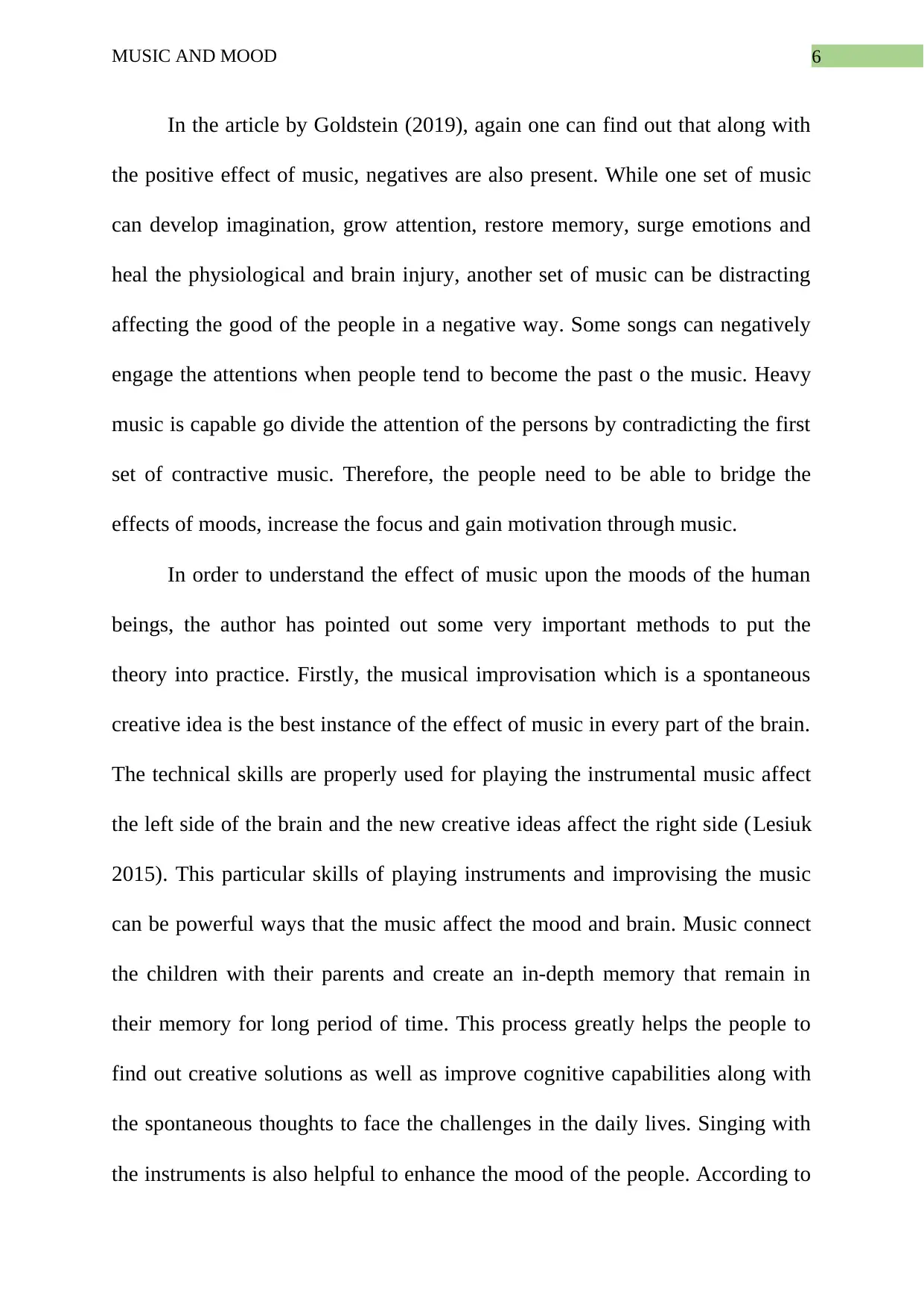
6MUSIC AND MOOD
In the article by Goldstein (2019), again one can find out that along with
the positive effect of music, negatives are also present. While one set of music
can develop imagination, grow attention, restore memory, surge emotions and
heal the physiological and brain injury, another set of music can be distracting
affecting the good of the people in a negative way. Some songs can negatively
engage the attentions when people tend to become the past o the music. Heavy
music is capable go divide the attention of the persons by contradicting the first
set of contractive music. Therefore, the people need to be able to bridge the
effects of moods, increase the focus and gain motivation through music.
In order to understand the effect of music upon the moods of the human
beings, the author has pointed out some very important methods to put the
theory into practice. Firstly, the musical improvisation which is a spontaneous
creative idea is the best instance of the effect of music in every part of the brain.
The technical skills are properly used for playing the instrumental music affect
the left side of the brain and the new creative ideas affect the right side (Lesiuk
2015). This particular skills of playing instruments and improvising the music
can be powerful ways that the music affect the mood and brain. Music connect
the children with their parents and create an in-depth memory that remain in
their memory for long period of time. This process greatly helps the people to
find out creative solutions as well as improve cognitive capabilities along with
the spontaneous thoughts to face the challenges in the daily lives. Singing with
the instruments is also helpful to enhance the mood of the people. According to
In the article by Goldstein (2019), again one can find out that along with
the positive effect of music, negatives are also present. While one set of music
can develop imagination, grow attention, restore memory, surge emotions and
heal the physiological and brain injury, another set of music can be distracting
affecting the good of the people in a negative way. Some songs can negatively
engage the attentions when people tend to become the past o the music. Heavy
music is capable go divide the attention of the persons by contradicting the first
set of contractive music. Therefore, the people need to be able to bridge the
effects of moods, increase the focus and gain motivation through music.
In order to understand the effect of music upon the moods of the human
beings, the author has pointed out some very important methods to put the
theory into practice. Firstly, the musical improvisation which is a spontaneous
creative idea is the best instance of the effect of music in every part of the brain.
The technical skills are properly used for playing the instrumental music affect
the left side of the brain and the new creative ideas affect the right side (Lesiuk
2015). This particular skills of playing instruments and improvising the music
can be powerful ways that the music affect the mood and brain. Music connect
the children with their parents and create an in-depth memory that remain in
their memory for long period of time. This process greatly helps the people to
find out creative solutions as well as improve cognitive capabilities along with
the spontaneous thoughts to face the challenges in the daily lives. Singing with
the instruments is also helpful to enhance the mood of the people. According to
Paraphrase This Document
Need a fresh take? Get an instant paraphrase of this document with our AI Paraphraser
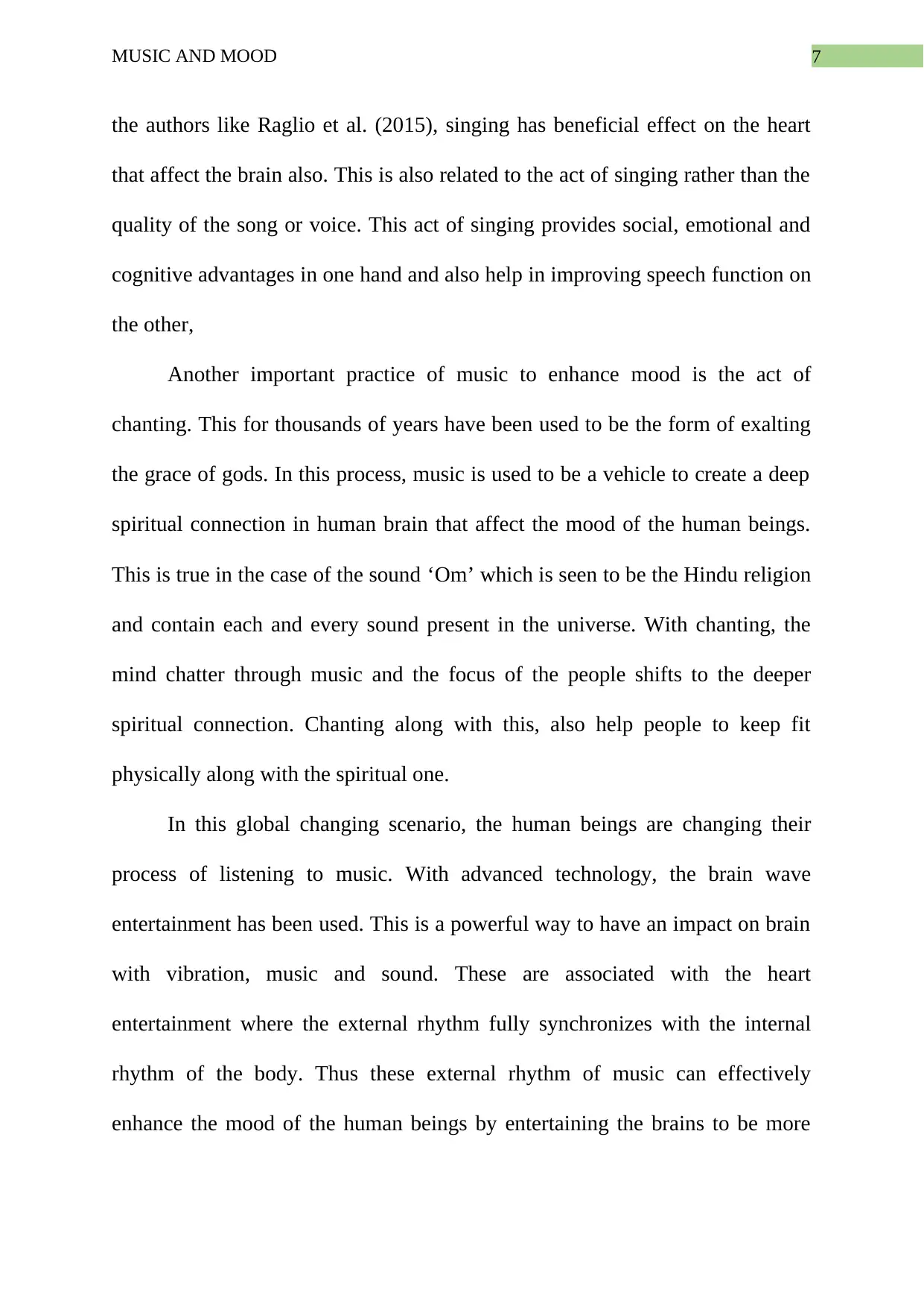
7MUSIC AND MOOD
the authors like Raglio et al. (2015), singing has beneficial effect on the heart
that affect the brain also. This is also related to the act of singing rather than the
quality of the song or voice. This act of singing provides social, emotional and
cognitive advantages in one hand and also help in improving speech function on
the other,
Another important practice of music to enhance mood is the act of
chanting. This for thousands of years have been used to be the form of exalting
the grace of gods. In this process, music is used to be a vehicle to create a deep
spiritual connection in human brain that affect the mood of the human beings.
This is true in the case of the sound ‘Om’ which is seen to be the Hindu religion
and contain each and every sound present in the universe. With chanting, the
mind chatter through music and the focus of the people shifts to the deeper
spiritual connection. Chanting along with this, also help people to keep fit
physically along with the spiritual one.
In this global changing scenario, the human beings are changing their
process of listening to music. With advanced technology, the brain wave
entertainment has been used. This is a powerful way to have an impact on brain
with vibration, music and sound. These are associated with the heart
entertainment where the external rhythm fully synchronizes with the internal
rhythm of the body. Thus these external rhythm of music can effectively
enhance the mood of the human beings by entertaining the brains to be more
the authors like Raglio et al. (2015), singing has beneficial effect on the heart
that affect the brain also. This is also related to the act of singing rather than the
quality of the song or voice. This act of singing provides social, emotional and
cognitive advantages in one hand and also help in improving speech function on
the other,
Another important practice of music to enhance mood is the act of
chanting. This for thousands of years have been used to be the form of exalting
the grace of gods. In this process, music is used to be a vehicle to create a deep
spiritual connection in human brain that affect the mood of the human beings.
This is true in the case of the sound ‘Om’ which is seen to be the Hindu religion
and contain each and every sound present in the universe. With chanting, the
mind chatter through music and the focus of the people shifts to the deeper
spiritual connection. Chanting along with this, also help people to keep fit
physically along with the spiritual one.
In this global changing scenario, the human beings are changing their
process of listening to music. With advanced technology, the brain wave
entertainment has been used. This is a powerful way to have an impact on brain
with vibration, music and sound. These are associated with the heart
entertainment where the external rhythm fully synchronizes with the internal
rhythm of the body. Thus these external rhythm of music can effectively
enhance the mood of the human beings by entertaining the brains to be more
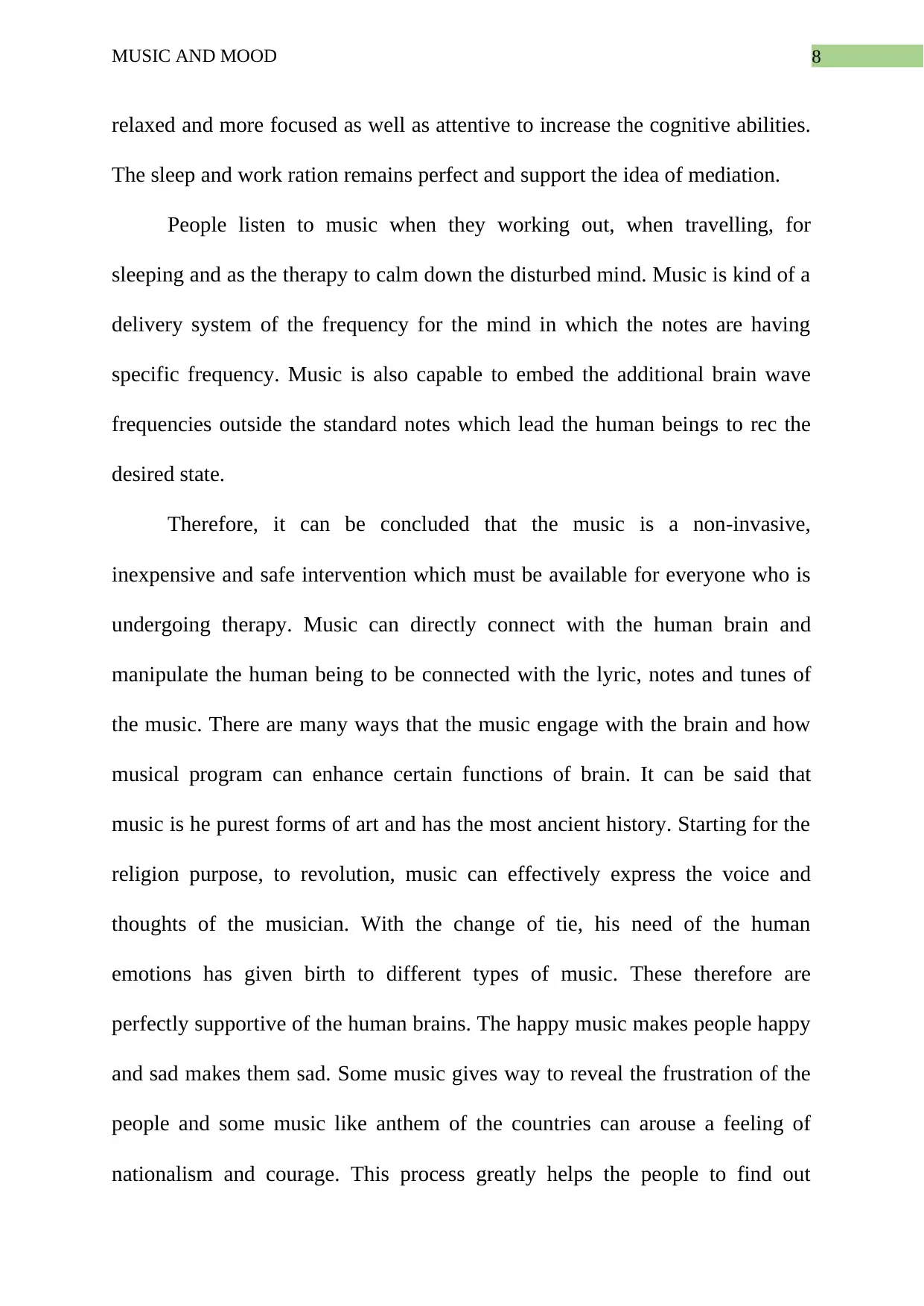
8MUSIC AND MOOD
relaxed and more focused as well as attentive to increase the cognitive abilities.
The sleep and work ration remains perfect and support the idea of mediation.
People listen to music when they working out, when travelling, for
sleeping and as the therapy to calm down the disturbed mind. Music is kind of a
delivery system of the frequency for the mind in which the notes are having
specific frequency. Music is also capable to embed the additional brain wave
frequencies outside the standard notes which lead the human beings to rec the
desired state.
Therefore, it can be concluded that the music is a non-invasive,
inexpensive and safe intervention which must be available for everyone who is
undergoing therapy. Music can directly connect with the human brain and
manipulate the human being to be connected with the lyric, notes and tunes of
the music. There are many ways that the music engage with the brain and how
musical program can enhance certain functions of brain. It can be said that
music is he purest forms of art and has the most ancient history. Starting for the
religion purpose, to revolution, music can effectively express the voice and
thoughts of the musician. With the change of tie, his need of the human
emotions has given birth to different types of music. These therefore are
perfectly supportive of the human brains. The happy music makes people happy
and sad makes them sad. Some music gives way to reveal the frustration of the
people and some music like anthem of the countries can arouse a feeling of
nationalism and courage. This process greatly helps the people to find out
relaxed and more focused as well as attentive to increase the cognitive abilities.
The sleep and work ration remains perfect and support the idea of mediation.
People listen to music when they working out, when travelling, for
sleeping and as the therapy to calm down the disturbed mind. Music is kind of a
delivery system of the frequency for the mind in which the notes are having
specific frequency. Music is also capable to embed the additional brain wave
frequencies outside the standard notes which lead the human beings to rec the
desired state.
Therefore, it can be concluded that the music is a non-invasive,
inexpensive and safe intervention which must be available for everyone who is
undergoing therapy. Music can directly connect with the human brain and
manipulate the human being to be connected with the lyric, notes and tunes of
the music. There are many ways that the music engage with the brain and how
musical program can enhance certain functions of brain. It can be said that
music is he purest forms of art and has the most ancient history. Starting for the
religion purpose, to revolution, music can effectively express the voice and
thoughts of the musician. With the change of tie, his need of the human
emotions has given birth to different types of music. These therefore are
perfectly supportive of the human brains. The happy music makes people happy
and sad makes them sad. Some music gives way to reveal the frustration of the
people and some music like anthem of the countries can arouse a feeling of
nationalism and courage. This process greatly helps the people to find out
⊘ This is a preview!⊘
Do you want full access?
Subscribe today to unlock all pages.

Trusted by 1+ million students worldwide
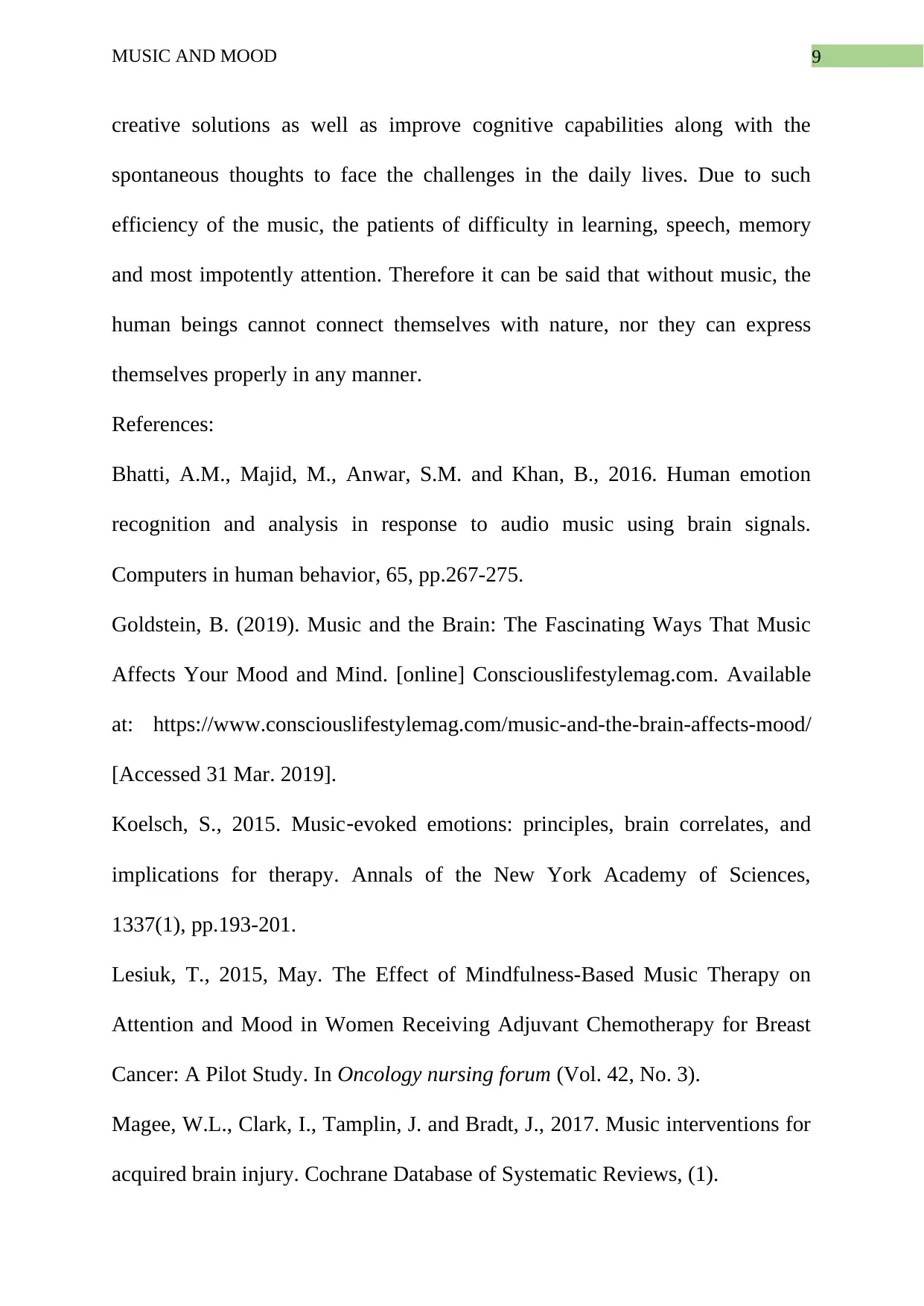
9MUSIC AND MOOD
creative solutions as well as improve cognitive capabilities along with the
spontaneous thoughts to face the challenges in the daily lives. Due to such
efficiency of the music, the patients of difficulty in learning, speech, memory
and most impotently attention. Therefore it can be said that without music, the
human beings cannot connect themselves with nature, nor they can express
themselves properly in any manner.
References:
Bhatti, A.M., Majid, M., Anwar, S.M. and Khan, B., 2016. Human emotion
recognition and analysis in response to audio music using brain signals.
Computers in human behavior, 65, pp.267-275.
Goldstein, B. (2019). Music and the Brain: The Fascinating Ways That Music
Affects Your Mood and Mind. [online] Consciouslifestylemag.com. Available
at: https://www.consciouslifestylemag.com/music-and-the-brain-affects-mood/
[Accessed 31 Mar. 2019].
Koelsch, S., 2015. Music‐evoked emotions: principles, brain correlates, and
implications for therapy. Annals of the New York Academy of Sciences,
1337(1), pp.193-201.
Lesiuk, T., 2015, May. The Effect of Mindfulness-Based Music Therapy on
Attention and Mood in Women Receiving Adjuvant Chemotherapy for Breast
Cancer: A Pilot Study. In Oncology nursing forum (Vol. 42, No. 3).
Magee, W.L., Clark, I., Tamplin, J. and Bradt, J., 2017. Music interventions for
acquired brain injury. Cochrane Database of Systematic Reviews, (1).
creative solutions as well as improve cognitive capabilities along with the
spontaneous thoughts to face the challenges in the daily lives. Due to such
efficiency of the music, the patients of difficulty in learning, speech, memory
and most impotently attention. Therefore it can be said that without music, the
human beings cannot connect themselves with nature, nor they can express
themselves properly in any manner.
References:
Bhatti, A.M., Majid, M., Anwar, S.M. and Khan, B., 2016. Human emotion
recognition and analysis in response to audio music using brain signals.
Computers in human behavior, 65, pp.267-275.
Goldstein, B. (2019). Music and the Brain: The Fascinating Ways That Music
Affects Your Mood and Mind. [online] Consciouslifestylemag.com. Available
at: https://www.consciouslifestylemag.com/music-and-the-brain-affects-mood/
[Accessed 31 Mar. 2019].
Koelsch, S., 2015. Music‐evoked emotions: principles, brain correlates, and
implications for therapy. Annals of the New York Academy of Sciences,
1337(1), pp.193-201.
Lesiuk, T., 2015, May. The Effect of Mindfulness-Based Music Therapy on
Attention and Mood in Women Receiving Adjuvant Chemotherapy for Breast
Cancer: A Pilot Study. In Oncology nursing forum (Vol. 42, No. 3).
Magee, W.L., Clark, I., Tamplin, J. and Bradt, J., 2017. Music interventions for
acquired brain injury. Cochrane Database of Systematic Reviews, (1).
Paraphrase This Document
Need a fresh take? Get an instant paraphrase of this document with our AI Paraphraser
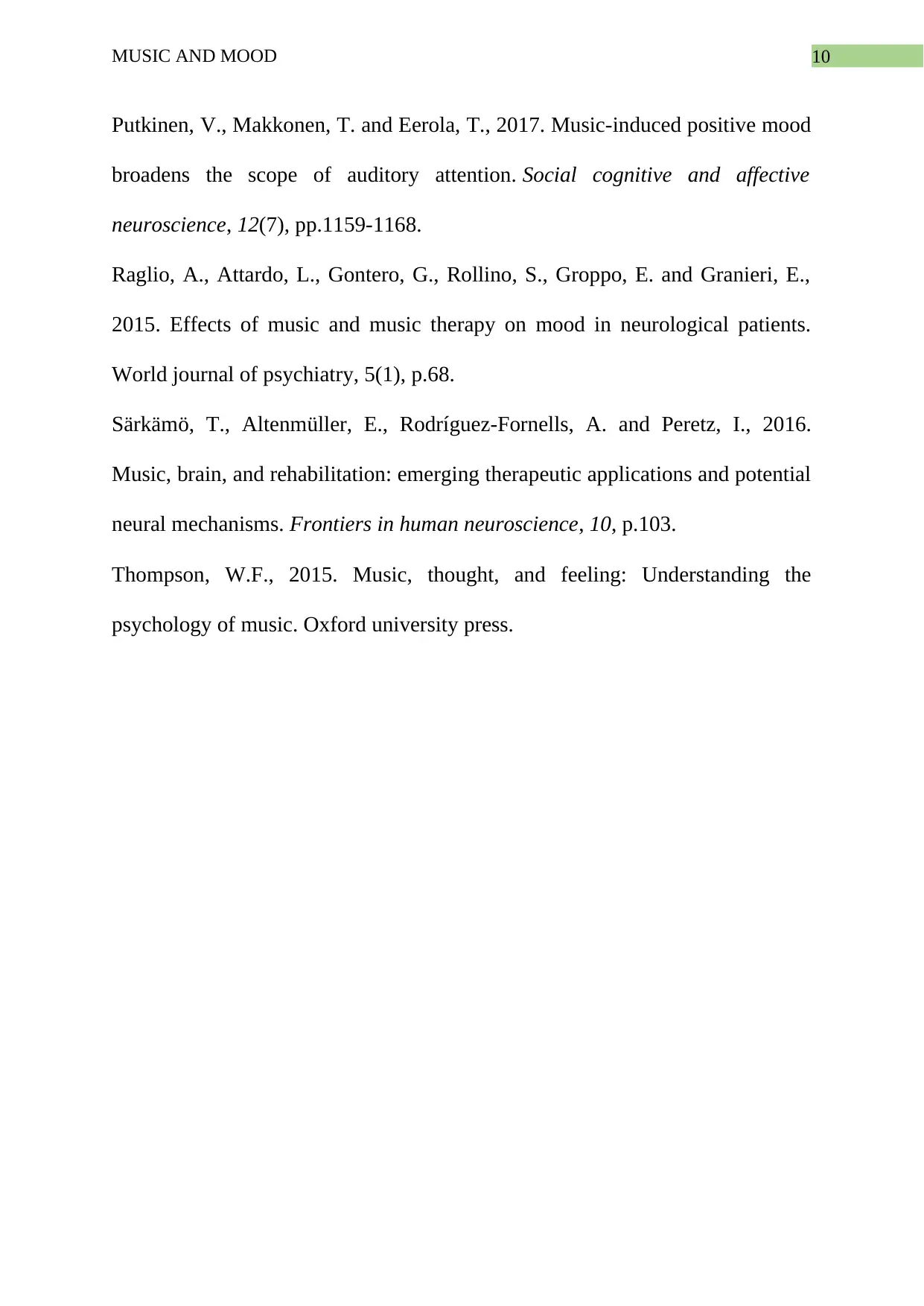
10MUSIC AND MOOD
Putkinen, V., Makkonen, T. and Eerola, T., 2017. Music-induced positive mood
broadens the scope of auditory attention. Social cognitive and affective
neuroscience, 12(7), pp.1159-1168.
Raglio, A., Attardo, L., Gontero, G., Rollino, S., Groppo, E. and Granieri, E.,
2015. Effects of music and music therapy on mood in neurological patients.
World journal of psychiatry, 5(1), p.68.
Särkämö, T., Altenmüller, E., Rodríguez-Fornells, A. and Peretz, I., 2016.
Music, brain, and rehabilitation: emerging therapeutic applications and potential
neural mechanisms. Frontiers in human neuroscience, 10, p.103.
Thompson, W.F., 2015. Music, thought, and feeling: Understanding the
psychology of music. Oxford university press.
Putkinen, V., Makkonen, T. and Eerola, T., 2017. Music-induced positive mood
broadens the scope of auditory attention. Social cognitive and affective
neuroscience, 12(7), pp.1159-1168.
Raglio, A., Attardo, L., Gontero, G., Rollino, S., Groppo, E. and Granieri, E.,
2015. Effects of music and music therapy on mood in neurological patients.
World journal of psychiatry, 5(1), p.68.
Särkämö, T., Altenmüller, E., Rodríguez-Fornells, A. and Peretz, I., 2016.
Music, brain, and rehabilitation: emerging therapeutic applications and potential
neural mechanisms. Frontiers in human neuroscience, 10, p.103.
Thompson, W.F., 2015. Music, thought, and feeling: Understanding the
psychology of music. Oxford university press.
1 out of 11
Related Documents
Your All-in-One AI-Powered Toolkit for Academic Success.
+13062052269
info@desklib.com
Available 24*7 on WhatsApp / Email
![[object Object]](/_next/static/media/star-bottom.7253800d.svg)
Unlock your academic potential
Copyright © 2020–2025 A2Z Services. All Rights Reserved. Developed and managed by ZUCOL.





